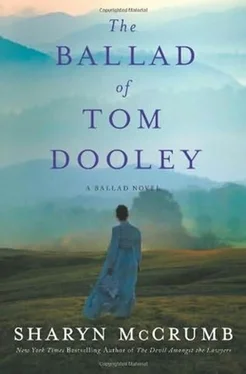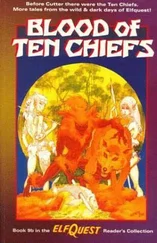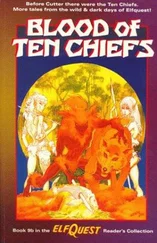He shrugged. “It’ll be uphill work then. They were dead set on hanging me afore they even knew for sure they had a corpse.”
I nodded. I knew as much from the briefing I had been given on the case by Captain Allison. “Feeling does seem to be running high against you. We will try to get the case tried in another county, where you may get a more impartial jury. And where I may get one as well. You know, Wilkes County was strong for the Union during the War. Twelve jurors from here might enjoy the chance to give the former Confederate governor one in the eye by convicting you.”
“So you want to move me?”
I nodded. “The legal term is a change of venue. I propose to get the case tried just over the line in Iredell County. I lived there after the fall of Raleigh, and I flatter myself that I am well known and liked in Statesville.”
“But you ain’t on trial, sir.”
I smiled. “Sometimes to a lawyer it can feel that way. Juries can be contrary. You can argue yourself blue in the face, and then see your man convicted because those fools in the box didn’t like the look of him. But never mind the politics of it. Let us begin with the facts. It would be best if you told me in your own words how you came to be in this jail, charged with this terrible crime.”
The cold blue eyes looked into mine, and he looked no more than a boy in his bewilderment. “On account of the women, I reckon,” he said at last. “The Bible says that Eve brought death into the world when she ate that apple, and I reckon females have been the death of us ever since.”
“And yet, it is a young woman who is the victim in this case, and it is you who are charged with being the serpent bringing death to her.”
***
He tried to make a gesture, but the shackles clanked, and he let his hand fall again to his side. “Laura Foster,” he said. “She didn’t count for much. Anybody will tell you that.”
I felt a chill when he said that. Did we in our war teach this mere boy that people’s lives were of no account? “That sentiment does you no credit,” I told him. “And it will not endear you to a jury. Also, it is not how the prosecution will argue it. Whatever this young woman was in life, death will have translated her into an angel of purity and radiance. Even people who knew her will begin to believe it.”
He scowled up at me, and the shackles clanked again. “That won’t make it true.”
“People believing it will make it true. That’s as close to truth as we get this side of heaven, son.”
I let him turn that over in his mind for a moment or two, and then I said, “Now I know that when the whispering started about you being responsible for this killing, you took off and went over into Tennessee, and that they caught you there and hauled you back. You do see, don’t you, that your flight across the state line will make people assume you are guilty?”
A smile flickered across his face. “Well, Governor, don’t you believe that, and I reckon it won’t be true.”
***
So it seems I have undertaken the defense of a boy soldier, who has no money and who cannot even be bothered to make protestations of innocence. I must be as stubborn as my opponents accuse me of being even to think of pursuing this. And yet I am bound to do it… though I cannot say what impels me. Is it a case of “There but for the grace of God go I?” I was once a poor mountain boy, with no powerful friends, and too proud to ask favors of anyone. But I don’t think I was so very like Thomas Dula, after all. The Lord Almighty may have smiled upon me, but it seems to me that He stood back and let me do most of the scut work of self-improvement all by myself.
I was born in 1832 in the mountains of Madison County, North Carolina, on a little mountain farm in Reems Creek, a few miles north of Asheville. The President then was Andrew Jackson, a dour backcountry fellow who had once practiced law one mountain and a state line over from there, in Jonesborough, Tennessee. I venture to say that my family’s hopes for me ran equally high, for I came of good stock, for all that we were hemmed in by mountains and far removed from the corridors of power.
David Vance, my father’s father, had fought with Washington at Brandywine, and froze with him at Valley Forge, before finishing up the War in his native South, alongside Colonel Sevier at the Battle of King’s Mountain. I reckon he enjoyed that skirmish more than he did the big battles up in Pennsylvania. I would have.
At King’s Mountain those volunteer soldiers, mountain farmers who marched from Tennessee and the hills of Carolina to face down the Redcoats on the South Carolina border, were a sight more successful than General Washington’s Continental Army up north. They beat the British in an hour, and walked back home to finish the harvest. So my people were mountain farmers, but they also had education and friends in high places, and they had seen more of the world than the other side of Reems Creek. After the War, my grandfather served in North Carolina’s General Assembly, so perhaps the disease of politicking was a hereditary one in my case, but the love of learning was instilled in me at my mother’s knee. When my grandfather died, he left a library of five hundred volumes, and my mother put it to good use in the evenings, gathering us children around the hearth, and reading to us, from Shakespeare, the Bible, the commentary of Julius Caesar. These nightly sessions with the classics taught me grammar and oratory, providing me with a wellspring of fine words that I could draw from in later life in my speeches in the courtroom or on the hustings.
When I was six, they sent me and my brother Robert over to Flat Creek, seven miles from home, to board with “Uncle Miah,” Nehemiah Blackstock, who was a friend of my grandfather, and, like him, a surveyor. He was also a stern Presbyterian, same as the Vances were, and he brooked no disobedience. Like the recording angel, he kept a list of our failings in his black book, which he would consult when deciding what punishment should be meted out to the young sinners in his care. Many’s the time I had been judged and found wanting by Uncle Miah, and he made sure I grew up to be a good and learned man, or else a careful one. But it was thanks to him and the other determined adults who had charge of me in my youth that I got an education and made a lawyer, instead of sitting in a cell like poor Dula.
After my tutelage at Uncle Miah’s, I was sent over to Tennessee to Washington College, which was little more than a grammar school, but it was a beacon of culture on the frontier, I suppose, and it smoothed away the rough edges of my primitive state, so that my penchant for arguing became a talent for debate, and my natural loquacity passed for oratory.
My father died when I was eleven, which dampened the family’s prosperity, and ended my formal schooling, but by then I had got the gist of education well enough to keep at it on my own, and by then I also had the determination to make myself a successful and prosperous man.
Later in life I learned that the daughters of the well-to-do are sent off to finishing school so that they may learn the proper way to move in polite society: which fork to use, how to make polite conversation, and those arcane passwords of speech and deportment by which the gentry are able to recognize one another as being “the right sort.” Without knowing anything of that custom, I set myself on that course at sixteen, when I took a job as a desk clerk at the Warm Springs Hotel, a resort and spa, built to take advantage of the natural mineral springs there in Madison County. The Warm Springs Hotel catered to the Eastern Seaboard gentry, who fled the fevers and miasmas of a southern summer in favor of the cool and bracing mountain air of the Carolina mountains. The guests barely noticed me, of course, for they thought that the denizens of the mountains were ill-bred and savage folk, and to them I was no more than a servant. But to me those rich folks from the flatland were exhibits in my private zoo, and I studied them with the care of a naturalist.
Читать дальше












